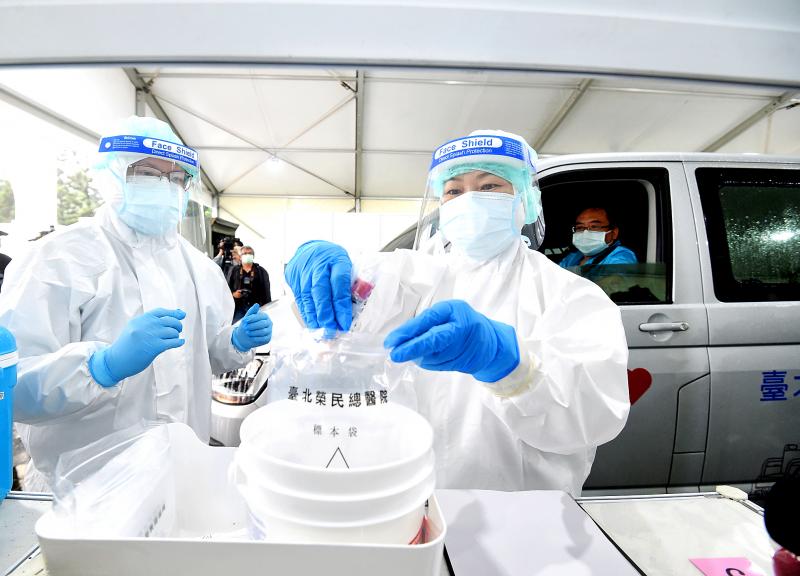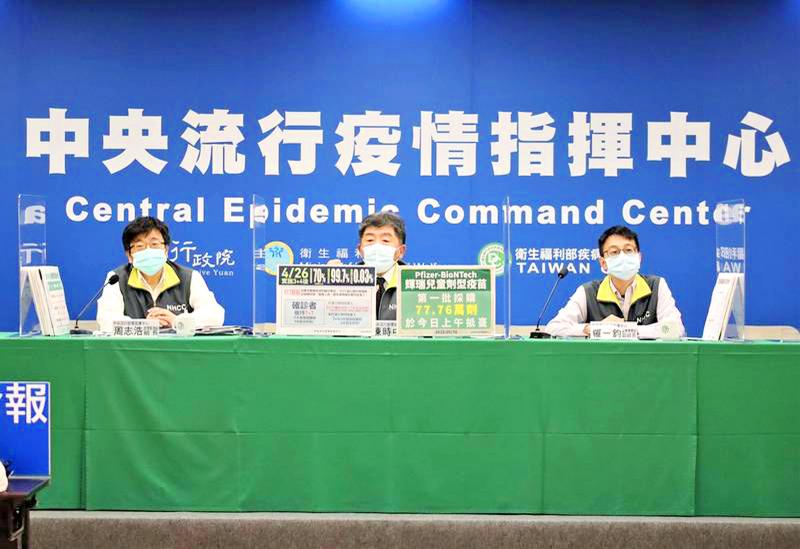Close contacts of COVID-19 cases who have received a booster shot no longer need to isolate at home, but should practice seven days of “self-disease prevention,” effective today, the Central Epidemic Command Center (CECC) said yesterday.
Minister of Health and Welfare Chen Shih-chung (陳時中), who heads the center, said that starting at 12am today, close contacts — people living in the same household — of those confirmed to be infected with COVID-19 are exempt from home isolation if they have received a booster shot of a COVID-19 vaccine.
Data from other countries show that people who have received a booster shot are at a reduced risk of severe illness from COVID-19 and are less infectious, he said, adding that the change allows close contacts with a booster shot to continue working.

Photo: Pin Fang-chao, Taipei Times
Close contacts would no longer be required to follow the “3+4” policy — isolate at home for three days and practice self-disease prevention for four days — but would need to follow a “0+7” policy — practice self-disease prevention for seven days.
Avoiding unnecessary outings, people following self-disease prevention must test negative with a rapid COVID-19 test within two days of leaving home, he said, adding that they must wear a mask and practice social distancing while away from home.
They are barred from dining in at restaurants, attending group meals or gatherings, and going to crowded venues or places where they might have direct contact with strangers, he added.

Photo courtesy of the Central Epidemic Command Center
Close contacts who have not received a booster shot are still required to follow the “3+4” policy, Chen said.
Confirmed cases are still required to quarantine for seven days, followed by seven days of self-health management, he added.
Starting tomorrow, people who are 65 or older and not under home quarantine, home isolation or self-disease prevention, but who test positive with a rapid COVID-19 test, can be diagnosed as a confirmed case by a doctor and prescribed the oral antiviral Paxlovid, he said.
Those aged 65 or older who test positive with a rapid test can bring the test kit to a nearby healthcare facility or show it during a telemedicine consultation, and ask the doctor to assess the result, Chen added.
If the patient and the doctor agree on the result, the doctor can report the patient as a confirmed COVID-19 case and evaluate whether Paxlovid should be prescribed.
If they disagree, the doctor can arrange for the patient to receive a polymerase chain reaction test or another rapid test.
People under home quarantine, home isolation or self-disease prevention who test positive with a rapid COVID-19 test and are eligible for a Paxlovid prescription — having met one of the 14 criteria showing that they have a higher risk of contracting the virus — can also receive a prescription from a doctor through a telemedicine consultation, he said.
Taiwan yesterday reported 61,697 new local COVID-19 infections and 29 deaths.
Centers for Disease Control (CDC) Director-General Chou Jih-haw (周志浩), head of the CECC’s disease surveillance division, said that 28 of the people who died had cancer, a catastrophic illness or underlying health conditions.
Sixteen of those who died (57 percent) were unvaccinated, while 23 (79 percent) had not received a booster shot, Chou said, adding that 17 of them were aged 80 or older.
CDC Deputy Director-General Philip Lo (羅一鈞), deputy head of the CECC’s medical response division, said that of 126 new cases with moderate symptoms, 57 (45 percent) were unvaccinated and of 22 new cases with severe symptoms, 11 (50 percent) were unvaccinated.
Taiwan had followed a “zero COVID” strategy because previous variants of SARS-CoV-2 had higher fatality rates, but as the Omicron variant has a significantly lower fatality rate, the nation is easing restrictions and learning to live with COVID-19, Lo said.
Asked whether confirmed cases who test positive after seven days of isolation can be infectious, Lo said studies suggest that the chance of a confirmed case being infectious after 10 days is near zero, while a Japanese study suggests that a virus culture is possible in 11 percent of cases after seven days of isolation.
A study from Singapore suggests that a virus culture is rarely possible in cases after five days of isolation, so only about 5 percent of cases would be infectious after seven days of isolation, he added.

A magnitude 7.0 earthquake struck off Yilan at 11:05pm yesterday, the Central Weather Administration (CWA) said. The epicenter was located at sea, about 32.3km east of Yilan County Hall, at a depth of 72.8km, CWA data showed There were no immediate reports of damage. The intensity of the quake, which gauges the actual effect of a seismic event, measured 4 in Yilan County area on Taiwan’s seven-tier intensity scale, the data showed. It measured 4 in other parts of eastern, northern and central Taiwan as well as Tainan, and 3 in Kaohsiung and Pingtung County, and 2 in Lienchiang and Penghu counties and 1

A car bomb killed a senior Russian general in southern Moscow yesterday morning, the latest high-profile army figure to be blown up in a blast that came just hours after Russian and Ukrainian delegates held separate talks in Miami on a plan to end the war. Kyiv has not commented on the incident, but Russian investigators said they were probing whether the blast was “linked” to “Ukrainian special forces.” The attack was similar to other assassinations of generals and pro-war figures that have either been claimed, or are widely believed to have been orchestrated, by Ukraine. Russian Lieutenant General Fanil Sarvarov, 56, head

SAFETY FIRST: Double the number of police were deployed at the Taipei Marathon, while other cities released plans to bolster public event safety Authorities across Taiwan have stepped up security measures ahead of Christmas and New Year events, following a knife and smoke bomb attack in Taipei on Friday that left four people dead and 11 injured. In a bid to prevent potential copycat incidents, police deployments have been expanded for large gatherings, transport hubs, and other crowded public spaces, according to official statements from police and city authorities. Taipei Mayor Chiang Wan-an (蔣萬安) said the city has “comprehensively raised security readiness” in crowded areas, increased police deployments with armed officers, and intensified patrols during weekends and nighttime hours. For large-scale events, security checkpoints and explosives

‘POLITICAL GAME’: DPP lawmakers said the motion would not meet the legislative threshold needed, and accused the KMT and the TPP of trivializing the Constitution The Legislative Yuan yesterday approved a motion to initiate impeachment proceedings against President William Lai (賴清德), saying he had undermined Taiwan’s constitutional order and democracy. The motion was approved 61-50 by lawmakers from the main opposition Chinese Nationalist Party (KMT) and the smaller Taiwan People’s Party (TPP), who together hold a legislative majority. Under the motion, a roll call vote for impeachment would be held on May 19 next year, after various hearings are held and Lai is given the chance to defend himself. The move came after Lai on Monday last week did not promulgate an amendment passed by the legislature that